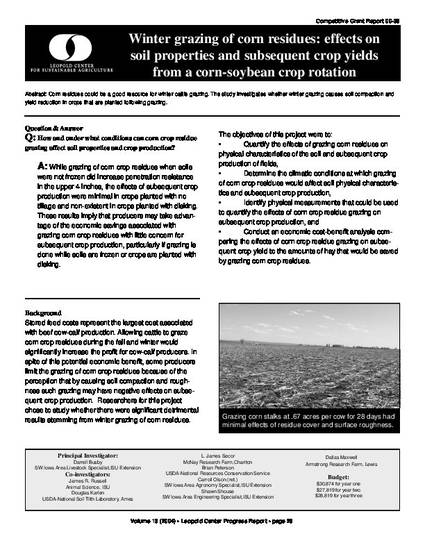
Unpublished Paper
Winter grazing of corn residues: Effects on soil properties and subsequent crop yields from a corn-soybean crop rotation
Leopold Center Completed Grant Reports
Project ID
2000-35
Abstract
Corn residues could be a good resource for winter cattle grazing. The study investigates whether winter grazing causes soil compaction and yield reduction in crops that are planted following grazing.
Key Question
How and under what conditions can corn crop residue grazing affect soil properties and crop production?
Findings
While grazing of corn crop residues when soils were not frozen did increase penetration resistance in the upper 4 inches, the effects of subsequent crop production were minimal in crops planted with no tillage and non-existent in crops planted with disking. These results imply that producers may take advantage of the economic savings associated with grazing corn crop residues with little concern for subsequent crop production, particularly if grazing is done while soils are frozen or crops are planted with disking.
Principal Investigator(s)
Darrell Busby
Co-Investigator(s)
James R. Russell, Douglas Karlen, L. James Secor, Brian Peterson, Carroll Olson, Shawn Shouse, Dallas Maxwell
Year of Grant Completion
2004
Disciplines
Citation Information
W. Darrell Busby, James R. Russell, Douglas L. Karlen, L. James Secor, et al.. "Winter grazing of corn residues: Effects on soil properties and subsequent crop yields from a corn-soybean crop rotation" (2004) Available at: http://works.bepress.com/douglas_karlen/3/
